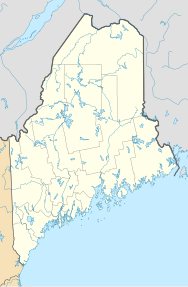Berwick, Maine
| Berwick, Maine | |
|---|---|
| Town | |

Sullivan Square in 1907
|
|
| Motto: Incorporated Ninth Town in Maine | |
| Location within the state of Maine | |
| Coordinates: 43°16′2″N 70°51′42″W / 43.26722°N 70.86167°W | |
| Country | United States |
| State | Maine |
| County | York |
| Incorporated | 1713 |
| Government | |
| • Type | Town Manager Plan |
| • Chairman | Tom Wright |
| • Vice-Chairman | Robert Crichton |
| • Selectmen | Edward Ganiere Mark Pendergast Joshua Plante |
| Area | |
| • Total | 37.86 sq mi (98.06 km2) |
| • Land | 37.52 sq mi (97.18 km2) |
| • Water | 0.34 sq mi (0.88 km2) |
| Elevation | 338 ft (103 m) |
| Population (2010) | |
| • Total | 7,246 |
| • Estimate (2012) | 7,460 |
| • Density | 193.1/sq mi (74.6/km2) |
| Time zone | Eastern (EST) (UTC-5) |
| • Summer (DST) | EDT (UTC-4) |
| ZIP code | 03901 |
| Area code(s) | 207 |
| FIPS Code | 23-23031 |
| Website | www.berwickmaine.org |
Berwick is a town in York County, Maine, United States. The population was 7,246 at the 2010 census. It is situated beside the Salmon Falls River.
Berwick is part of the Portland–South Portland–Biddeford, Maine metropolitan statistical area.
Originally part of Kittery, the area later comprised by Berwick was settled about 1631 and called Kittery Commons or Kittery North Parish. It was later called Unity after the ship that transported Scots prisoners of war from the Battle of Dunbar in 1650 to the colonies. (These Scots had been force-marched to Durham Cathedral in Durham, England, then tried for treason for supporting Charles II rather than Oliver Cromwell, Lord Protector. Many settled near Berwick in an area near the northern Eliot-York border, which came to be known – and still is – as Scotland Bridge.)
Landing in Massachusetts, the royalist soldiers were sold as indentured servants, many of whom went to work at the Great Works sawmill, located on the Great Works River, until they were able to pay for their own freedom. (George Gray, formerly of Lanark, Scotland, was an example of the 150 prisoners who endured this ordeal. In 1675, he defended his family and lands when the community was attacked during King Philip's War, and died in Unity in 1693. His descendants would populate other areas of Maine, notably Deer Isle and Stonington, Maine).
...
Wikipedia

